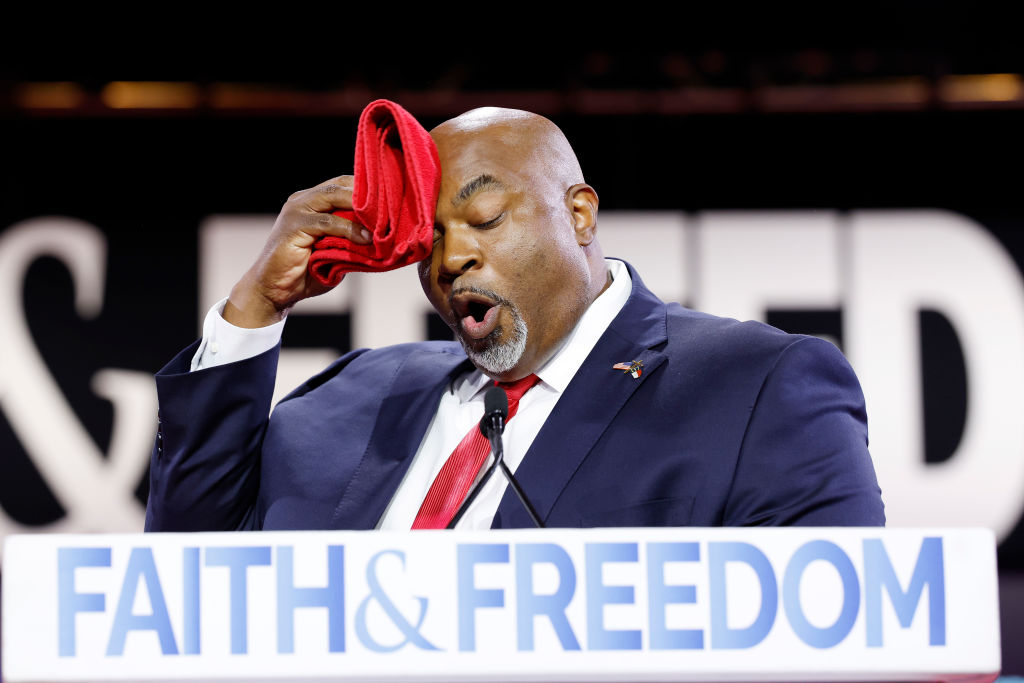All you need to know about the modern right is that Mark Robinson is only its third-most popular black Nazi.
Well … “Nazi” might be a bit strong to describe Kanye West and Candace Owens, although only a bit. But it’s a fair cop for Robinson if this new CNN report is accurate. Allegedly, it’s how he once described himself.
Robinson is the GOP candidate for governor in North Carolina. We’ve gotten used to Republicans nominating “the craziest son of a b–ch in the race,” in the words of Rep. Thomas Massie, but Robinson’s credentials on that point are so sterling that they belong in the window at Tiffany’s. Even before CNN went digging through his internet archives and turned up comments about “Martin Lucifer Koon” and the virtues of slavery, he had built a reputation as an unusually loose cannon by the already very loose standards of right-wing populism.
Loose enough that he was apparently promoting Holocaust denial years before Republican edge lords decided that promoting Holocaust denial was cool.
Not everything unearthed by CNN was as troubling as that, but some of it might pose a political problem for Robinson regardless. “I like watching tranny on girl porn! That’s f—ing hot!” he once allegedly wrote on an internet forum. To each his own, but in Donald Trump’s party of culture war, it’s anyone’s guess whether finding trans women titillating is more or less forgivable at this point than being a “free-thinker” about slavery.
Although Robinson denies that he left any of the comments CNN attributed to him, the circumstantial evidence of authorship is overwhelming. (He claims it’s all a dirty trick somehow concocted via AI.) He vowed after the story broke that he wouldn’t withdraw from the race, giving the North Carolina Republican Party little choice but to stick by him.
None of which is very interesting, frankly, as Republican candidates grossing everyone out and being dutifully defended by party apparatchiks anyway is another thing we’ve all gotten used to. “Mark Robinson is wackadoodle” is a dog-bites-man story at this point in the 2024 cycle.
But there are two interesting facets to it. One is how much more credulous populists were on Thursday about the Robinson scandal du jour relative to the average Trump scandal du jour. “It’s very rare that a story on a Republican that’s treated like a bombshell by establishment media actually is one; but this one really is,” Breitbart reporter Matthew Boyle wrote of CNN’s investigation, capturing the vibe among the MAGA faithful. “It was very tough to see a pathway for Robinson before this. Now, it’s basically gone. This guy is in serious trouble.”
Robinson is indeed in serious trouble. He’s en route to being Mastriano’d, i.e., getting blown out in what should have been a winnable gubernatorial race in a swing state by a Democratic attorney general named Josh.
But even more interesting than populists’ scandalous double standard toward scandals was the timing of the CNN report. Why is this appearing now?
Whodunnit?
When a news outlet drops a bomb on a political candidate, the munition was often prepared with help from the opposing party. Parties employ opposition researchers to gather dirt on the other side, then launder that dirt at an opportune moment through reporters who are hungry for a scoop. That’s politics.
But Thursday wasn’t an opportune moment for North Carolina Democrats to attack Robinson. The opposite, in fact: It turns out that midnight on Thursday evening was the state’s deadline for candidates to withdraw before ballots were printed. By publishing when it did, CNN gave Republicans a last-second chance to convince Robinson to drop out and to replace him with a more electable candidate, their own version of the Democratic switcheroo in the presidential race.
If Democrats had supplied CNN with the dirt in this case, one would assume it would have come with the condition that it couldn’t be published until after the withdrawal deadline had passed. They want Robinson in this race! And of course they want to maximize the political impact of any oppo research they’ve assembled on him, which logically should mean releasing it in mid- or late October, not now.
It’s Republicans who had an incentive to give Robinson a hard shove before the withdrawal deadline.
Local party figures have known for a while what was coming about their candidate, it seems. Conservative radio host Erick Erickson claims that, as far back as last year, North Carolina consultants warned him that “there were lots of bad things that would come out about Robinson including ‘weird online sex stuff’ or something like that.” As the gubernatorial race turned uncompetitive in August, Republican leaders might have lost hope for a comeback and dropped a dime on him at CNN in hopes of shaming him out of the campaign ASAP.
Swapping him out this month for a more respectable Republican nominee might have conceivably had the same energizing effect on the right as swapping out Joe Biden for Kamala Harris had on the left. But I’m skeptical: Robinson is now far behind, much further than Biden was relative to Trump when he quit, which would have left any replacement nominee with an improbable amount of ground to make up and much less time than Harris had to do it.
I don’t think it was the race for governor that made local Republicans anxious about Robinson, as they’ve presumably already written it off. I think it was the presidential race, and in particular how Robinson’s cavalcade of disgrace might potentially influence it.
Harris’ ascent in polling has been especially steep in North Carolina, where Trump’s lead of more than 5 points over Biden was cut instantly in half by the new Democratic nominee in July and kept on eroding. By mid-August, it was down to 1.5 points; by the end of the month, just half a point. As I write this on September 20, Trump is ahead by … one-tenth of a point. A state won by Republicans in 10 of the last 11 presidential elections, with nearly as many Electoral Votes as Pennsylvania, is suddenly dead even.
And now here’s the party’s gubernatorial nominee in a marquee statewide race with scandals blowing up around him like he’s on the golf course at the end of Caddyshack.
Could Trump’s chances of holding North Carolina be collateral damage?
Reverse coattails.
Before Biden dropped out, some Democrats argued that he might squeak out victories in the swing states with help from candidates down ballot.
Normally, it’s the candidate at the top of the ticket who drags everyone else over the finish line, not vice versa. But liberals noticed that their party’s Senate candidates in battlegrounds were polling quite well relative to the president and wondered if voters turning out for those Senate races might end up holding their noses and voting for Biden as well.
It was an inversion of the idea that popular presidential nominees have “coattails.” Maybe in 2024 there’d be reverse coattails, with the nominee riding the popularity of his party’s lesser officers.
Democrats are now eyeing North Carolina and wondering if Robinson will have reverse coattails for Trump—except by carrying Trump to defeat instead of victory.
This strikes me as wishful thinking. Mostly.
No justice would be more poetic than Donald Trump losing the presidency thanks to a candidate who wouldn’t have been viable in American politics but for Trump’s own influence. Trumpism taught Republican voters to treat their own moral scruples as “weakness” and to prize vacuous politically incorrect pugnacity in candidates instead. That’s how you get Mark Robinson, which in turn is how you get blown out in a gubernatorial election, which in turn is how, per the wishful thinking, Trump ends up losing North Carolina as anti-Robinson sentiment bleeds over into his own vote share.
It’s a nice thought. But there’s a reason “coattails” is a familiar concept and “reverse coattails” is not: Parties are defined by their leaders, especially in presidential election years and especially when that leader is as colorful and domineering as Donald Trump. The “reverse coattails” theory seemed plausible-ish with respect to Joe Biden because Biden was/is a remarkably weak political personality amid his senescence, barely president at all. Under those circumstances, one could imagine voters taking their cues from Senate candidates instead.
Trump is different. He’s so vivid and singular a persona that he reliably turns out voters who otherwise don’t bother much with politics. And because he’s so remarkably polarizing, any election in which he’s on the ballot tends to be “about” him. It’s far more likely that Mark Robinson will overperform his polling due to Trump fans turning out en masse for the GOP than that Trump will underperform his polling due to revulsion at Robinson.
Besides: By what theory, precisely, is Mark Robinson’s candidacy an affront to decency yet Donald Trump’s is not? It wasn’t Robinson who said on Wednesday that if he loses in November “in my opinion, the Jewish people would have a lot to do with a loss.” Both men seem to be sexually licentious, unusually vicious in their political rhetoric, and way too comfortable with bigots. If you’ve successfully normalized Trump, as all Trump supporters in North Carolina have, Robinson shouldn’t cause any crisis of conscience.
And even if he did, Trump’s unique stature as leader of his party, godfather of modern right-wing populism, pope of his own cult of personality, and martyr in an ever more elaborate persecution narrative should insulate him from any spillover.
What’s strange, though, is that North Carolina Republican officials … do seem worried. The fact that they (probably) tried to drive Robinson out of the race this week suggests they think he might have reverse coattails for Trump and are eager to eliminate the risk.
How can that be? Well, start with the margins. If this state is destined to end in a photo finish a la Georgia or Arizona in 2020, a “reverse coattails” effect could be tiny but still decisive. A few thousand right-leaning centrists growing gradually more disgusted with Robinson’s perpetual scandal machine before Election Day might turn them off of voting altogether. That could potentially be curtains for Trump.
Also noteworthy is the fact that Harris is performing considerably better with suburbanites in North Carolina this year than Biden did in 2020. Four years ago, he won just 39 percent of that cohort, far below his national average of 50; Harris is currently polling at 51 percent by comparison. Chronic exposure to Robinson’s toxic gonzo populism over the next six weeks could compound some undecided suburbanites’ preexisting misgivings about Trump and tip them over into preferring Harris.
Especially since, as noted, Trump and Robinson are birds of a feather. It would be easy for centrist voters to compartmentalize voting Republican for president but not for governor if the two candidates were worlds apart temperamentally. But when they’re of a piece, and when Trump is on video lavishing praise on Robinson …
… maybe the righteous contempt they’ve already developed for one will goose a sense of righteous contempt for the other. The Trump-Robinson tandem is practically built in a lab to make Reaganites blanch and think, “This has gone too far. It’s time to burn it all down.”
Is that worth an extra 3 points, say, in North Carolina for Kamala Harris on Election Day? Not remotely. Is it worth an extra three-tenths of a point? Not unthinkable. And the further behind Robinson falls in his race, the more freakishly huge the ticket-splitting at the top of the ballot will need to be in order to get Trump over the hump.
With the polling the way that it is, three-tenths of a point there could decide the entire national election. And so ultimately the presidency may come down to a single question.
How many Mike DeWines are there in the North Carolina suburbs?
Compartmentalization.
There were many depressing (yet funny) reactions on the right to CNN’s Robinson scoop after it dropped. For instance, behold the populist drug dealer wondering why everyone around him keeps overdosing. “Perhaps the American primary voter should start nominating normies for high office. I dunno. Just a thought,” Daily Wire co-founder Ben Shapiro tweeted.
Shapiro gave Candace Owens a platform for years at The Daily Wire and announced this spring that he’d host a fundraiser for Trump, in case you’re wondering how much he values normalcy. That he felt obliged to frame his objection to Robinson in electoral rather than moral terms illustrates my point earlier about the ethics of Trumpism: One gets the sense that if Robinson were on track to win his race, Ben would have shrugged and let the CNN story pass without comment.
Another downer came from right-wing pollster Patrick Ruffini, who concluded that the GOP’s enduring problem with nominating lunatics is the fault of … former Arizona Gov. Doug Ducey? “Who were the big-name GOP candidates capable of unifying the entire party who stepped up to run against Mastriano and Mark Robinson,” Ruffini tweeted Thursday. “If you’re upset that the GOP is blowing a Senate opportunity in AZ, for instance, a lot of the blame for that rests with Doug Ducey not running.”
The reason no “big-name GOP candidates capable of unifying the entire party” stepped forward to challenge Robinson, of course, is because those candidates have been hunted to near-extinction. Every mainstream Republican on Trump’s enemies list who’s thinking of running for office now knows they’re guaranteed a serious primary challenge eagerly backed by Trump and a bevy of threats made against them and their families by Trump’s nuttier minions.
Doug Ducey, Chris Sununu, Charlie Baker, Mark Brnovich, Jeff Sessions, and many others either opted against running to spare themselves that aggravation or did run and predictably ended up getting squashed. If their reluctance to challenge the likes of Robinson upsets you, blame the vindictive dirtbag at the top who’d rather lose winnable races than see his antagonists within the party succeed.
Or blame Republican primary voters, whose appetite for demented populism is so voracious that they’ve been known to prefer the craziest son of a b—h in the race even when Trump prefers someone else. What Jonathan Chait describes as the GOP’s “wackjob problem” is as much a problem of demand as supply.
The most depressing commentary I saw on Robinson, though, had nothing to do with him or with North Carolina. It came from Ohio Gov. Mike DeWine, one of the more honorable people left in the party who’s done an especially honorable job lately.
On Friday, DeWine published an op-ed in the New York Times hoping to set the record straight about whether dusky foreign usurpers in Springfield are eating pets, as some unusually sleazy demagogues would have you believe. It’s not true, the governor insisted. It’s not even true that they’re a drain on the community. “Springfield is having a resurgence in manufacturing and job creation,” he noted, and some of that “is thanks to the dramatic influx of Haitian migrants who have arrived in the city over the past three years to fill jobs.”
Speaking up against a smear campaign that carries poisonous civic consequences is good leadership. But tucked away in DeWine’s column is this: “As a supporter of former President Donald Trump and Senator J.D. Vance, I am saddened by how they and others continue to repeat claims that lack evidence and disparage the legal migrants living in Springfield. This rhetoric hurts the city and its people, and it hurts those who have spent their lives there.”
If the candidates you support are hurting your constituents—quite deliberately, for purely selfish reasons—why are you still supporting them?
A few days ago, Jonathan Last wondered how many Republican voters in Springfield would go to the polls this fall and either reward Trump and Vance for their scaremongering or compartmentalize it away as lamentable but not quite disqualifying. One can ask the same question of voters in North Carolina who are disgusted by Mark Robinson, a man elevated by Trump’s movement and embraced by Trump himself until 24 hours ago. At what point does the ungodly long list of Trumpist sins at last reach disqualification-length?
As North Carolinians go with respect to that question, so goes the election.










Please note that we at The Dispatch hold ourselves, our work, and our commenters to a higher standard than other places on the internet. We welcome comments that foster genuine debate or discussion—including comments critical of us or our work—but responses that include ad hominem attacks on fellow Dispatch members or are intended to stoke fear and anger may be moderated.
With your membership, you only have the ability to comment on The Morning Dispatch articles. Consider upgrading to join the conversation everywhere.